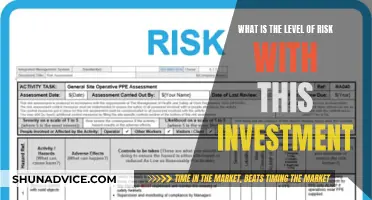
There are many ways to make a home an investment, from owning physical property to online crowdfunding platforms. Buying a home could be a smart investment or a risky one, depending on where you buy, your financial situation, and the timing of your purchase.
If you are a first-time homebuyer, you can buy a home to live in for a year and then rent it out, buy and live in one unit in a multifamily home, or buy a home to flip for a profit.
There are several benefits to investing in a home. For one, you save money on rent, which is unrecoverable. If you put that money toward a mortgage, you are working toward fully owning something tangible that can increase in value over time. Additionally, if you itemize your deductions on your tax return, you can deduct mortgage interest and property tax payments on your taxes every year.
However, there are also drawbacks to investing in a home. Acquisition costs are high, with housing prices skyrocketing and mortgage interest rates remaining steep. Appreciation is also not a sure thing, as the value of homes in a given area depends on the overall economy of that area.
Ultimately, whether or not buying a house is a good investment depends on your financial circumstances and goals.
| Characteristics | Values |
|---|---|
| Rental income | Passive income |
| Appreciation | Long-term financial security |
| Tax benefits | Tax deductions |
| Diversification | Diversified portfolio |
| Management experience | Gaining management skills |
| Depreciation | Loss of property value |
| Vacant rentals | Loss of rental revenue |
| Management responsibilities | Maintenance and tenant management |
| Financing risks | Difficulty refinancing |
| Legal liability | Legal responsibilities |
What You'll Learn

Rental Properties
Define Your Investment Goals
The first step is to set clear investment goals and prioritize what's important to you. Do you want to focus on cash flow, appreciation, tax benefits, or portfolio growth/diversification? For example, if you want to prioritize cash flow, you might look for properties that generate positive monthly cash flow after covering all expenses, such as multi-family apartments or single-family homes in high-demand areas.
Build a Strong Financial Foundation
Start by saving and creating an emergency fund to cover any unexpected expenses or vacancies. Improve your credit score by paying down existing debts and paying bills on time. This will help you secure more favorable financing terms when investing in rental properties.
Understand Financing Options
It's important to know your financing options before investing in rental properties. Typically, a down payment of at least 20% of the property's purchase price is required, but there are other expenses to consider, such as closing costs and property inspection fees. Traditional mortgage lenders, private mortgage lenders, Federal Housing Administration (FHA) loans, and Veterans Affairs Home (VA) loans are some common financing options.
Research Potential Markets
Location is critical when investing in rental properties. Look for markets with strong demand, rental income potential, and appreciation prospects. Study local factors such as job growth, population trends, school quality, crime rates, and proximity to amenities. Also, consider taxes and legal restrictions, such as rent control laws and tenant rights, which may impact your cash flow and management authority.
Choose the Right Property
Decide on the type of property (single-family, multi-family, or commercial), its condition (whether it needs repairs or renovations), the neighborhood's reputation and amenities, and the rental income potential. Analyze comparable properties in the area and consider vacancy rates and potential rental income growth.
Understand the Numbers
To ensure profitability, calculate your expected return on investment (ROI) by considering rental price, expenses (including property management fees, property taxes, insurance, maintenance, and utilities), cash flow analysis, and potential appreciation. A higher ROI indicates a more profitable investment.
Consider Professional Property Management
Rental management can be time-consuming, especially if you have a full-time job or live out of state. Professional property management companies can handle the day-to-day tasks of running a rental property, freeing up your time and reducing stress. Even if you plan to manage the property yourself, it's a good idea to factor the cost of a property manager into your budget.
Financing, Operating, and Investing: Activities in Need of Explanation
You may want to see also

Real Estate Investment Groups (REIGs)
In a typical REIG, a company buys or builds a set of apartment blocks or condos. A single investor can own one or multiple units of self-contained living space, but the company operating the investment group collectively manages all the units, handling maintenance, advertising vacancies, and interviewing tenants. In exchange for conducting these management tasks, the company takes a percentage of the monthly rent.
REIGs are an excellent option for passive investing in real estate. They allow investors to speculate in real estate without bearing the commitment alone and being the sole funding source. REIGs are also attractive because they offer several ways of gaining returns. They may buy stakes in apartment buildings, rental homes, commercial buildings, or commercial units. They may also earn income from mortgage lending, rental properties, or property management fees.
However, it is important to note that REIGs often have formal agreements stipulating when and how members can access their money. If you want to withdraw from the group, you may not be able to recoup your investment or share of the profits immediately, limiting your liquidity. REIGs can also have set fees, which can be costly, especially when profits are slim or losses occur.
When evaluating a REIG to join, look for a group with a proven track record of successful real estate investments and transparent business operations, investment strategies, property acquisitions, and financial performance. It is also crucial to evaluate the experience and expertise of the management team and review the group's financial statements to assess its financial stability and performance.
Investing Aggressively at 75: Is It Too Late?
You may want to see also

Flipping Properties
There are two types of house flipping:
- An investor buys a property that has the potential to increase in value with the right repairs and updates. After completing the work, they sell the home for a much higher price than what they purchased it for. This is often referred to as a "fix and flip."
- An investor buys a property in a market with rapidly rising home values. They make no updates and, after holding the property for a few months, resell it at a higher price, making a profit.
- Time and money: Flipping properties requires a significant amount of time and money. It can take months to find the right property, and the renovation process can be time-consuming and costly.
- Skills and knowledge: It is important to have the necessary skills and knowledge to renovate the property or to hire reputable contractors who can do the work for you.
- Patience and good judgment: Flipping properties is a timing-based business, and it is important to be patient and make well-informed decisions.
- Budgeting: Creating a detailed budget and sticking to it is crucial. Surprise repairs and renovations that get out of hand can quickly eat into your profits.
- Location and market research: Understanding the real estate market and property values in the area you are flipping is essential. Working with a local real estate agent can help you make more informed decisions.
- Financing: It is generally recommended to pay for the property with cash to avoid the risks associated with debt and mortgage payments.
- Team of professionals: Building a team of trusted professionals, including contractors, real estate agents, attorneys, and accountants, can help ensure a smoother process and better outcomes.
- Potential risks and losses: Flipping properties comes with significant financial risks, including the possibility of unexpected issues, legal issues, and potential financial losses if the property does not sell quickly or for the desired price.
Social Security's Equity Investment Prohibition: Why?
You may want to see also

Real Estate Investment Trusts (REITs)
REITs are bought and sold on major stock exchanges, and they offer a number of benefits to investors. They provide stable cash flow through dividends, portfolio diversification, and exposure to real estate without the complexities of direct property ownership.
There are two main types of REITs: Equity and Mortgage. Equity REITs own or operate income-producing real estate, while Mortgage REITs lend money to real estate owners and operators or invest in mortgage-backed securities.
When investing in REITs, it is important to consider the risks, such as interest rate sensitivity, economic downturns, and sector-specific challenges. Additionally, it is recommended to start with publicly traded REITs, which are more accessible and offer better liquidity.
REITs are a good option for those seeking portfolio exposure to real estate without the traditional real estate transaction. They are also suitable for investors who want regular income, as REITs pay out high dividends.
Diversity Investments: Managers' Role in Creating Inclusive Spaces
You may want to see also

Online Real Estate Platforms
Benefits of Online Real Estate Platforms
- Diversification: You can diversify your investment portfolio by investing in a range of properties across different geographies.
- Lower Costs: These platforms offer a more affordable way to invest in real estate, with some requiring a minimum investment of just $10.
- Accessibility: Many platforms are open to non-accredited investors, meaning you don't need to have a high net worth or income to participate.
- Passive Income: You can earn passive income through dividend payouts and property appreciation.
- Convenience: You can invest from the comfort of your home, without needing to set foot on a property.
Things to Consider
- Risk and Illiquidity: Real estate crowdfunding can be riskier than other forms of investing, and many platforms require your money to be locked up for several years.
- Fees: While fees vary, some platforms charge management fees that can eat into your profits.
- Research: It's important to thoroughly research any platform and investment opportunity before committing your money.
Examples of Online Real Estate Platforms
- RealtyMogul: One of the top crowdfunding platforms, offering pre-vetted REITs and individual properties.
- Fundrise: Accepts non-accredited investors and offers a range of investment options, including commercial real estate projects and venture capital funds.
- EquityMultiple: For accredited investors looking to invest in commercial real estate, equity, and debt.
- PeerStreet: Focuses on real estate debt investing, giving investors access to high-yield, short-term loans made to borrowers.
Indian Chickpea Exports: A Smart Investment Strategy
You may want to see also
Frequently asked questions
There are several benefits to investing in a home. Firstly, it can lead to long-term financial security and wealth accumulation through increased home equity and tax breaks. Secondly, real estate generally appreciates in value over time, resulting in significant gains, especially for younger investors. Additionally, owning a home provides tax benefits, such as deductions for mortgage interest, property taxes, and depreciation. Lastly, investing in a home can diversify your investment portfolio, reducing overall risk compared to investing solely in stocks and bonds.
One of the main risks of investing in a home is the potential for depreciation. Markets can fluctuate, and property values may decrease over time. Additionally, there are financing risks; if the property's value drops, refinancing or selling may become challenging. Other risks include vacant rentals, management responsibilities, and legal liabilities associated with tenant issues or property accidents.
There are several financing options available for purchasing an investment property, including conventional loans, government-backed loans (FHA or VA loans), and jumbo loans. Conventional loans typically require a higher credit score and a down payment of at least 3% of the property's cost. Government-backed loans offer more flexible options for borrowers with lower credit scores and down payments. Jumbo loans are for more expensive properties and have stricter requirements set by the lender.
When buying an investment property, it is crucial to assess your finances, including your credit score, down payment, closing costs, and monthly mortgage payments. Additionally, research the market and work with a knowledgeable real estate agent to understand property prices, rental demand, and local trends. It is also essential to shop for mortgage options and get pre-approved before making an offer on a suitable property. Due diligence is key—conduct a home inspection, get a property appraisal, review the property history, and estimate potential rental income.







